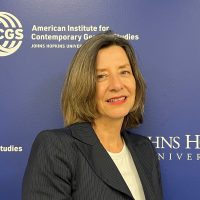
Abdulhamid Hosbas/Anadolu Agency/Getty Images
On Identity: Where Are You Really From?

Susanne Dieper
Director of Programs and Grants
Susanne Dieper is the Director of Programs and Grants at AICGS. She oversees the Institute’s programs and projects within the three AICGS program areas, manages all AICGS fellowships, and is in charge of grant writing. Her current focus is on issues related to transatlantic relations, immigration and integration, diversity, the next generation of leaders, workforce education, and reconciliation. She develops programs that align with the mission of AICGS to better understand the challenges and choices facing Germany and the United States in a broader global arena.
Previously, Ms. Dieper was in charge of organizational and project management at AICGS as well as human resource development and board of trustees relations. Prior to joining AICGS, she worked in transatlantic exchange programs, language acquisition, as well as the insurance industry in Germany.
Ms. Dieper holds an MBA from Johns Hopkins University with a concentration in International Business and an MA in English Linguistics and Literature, History, and Spanish from the University of Cologne. She has completed course work in nonprofit management at Johns Hopkins University.
__
The Centre for Turkey Studies and Integration Research (Stiftung Zentrum für Türkeistudien und Integrationsforschung) at the University of Duisburg-Essen conducts an annual multi-topic study involving citizens of Turkish descent who live in North-Rhine Westphalia. The purpose of the study is to determine how this minority population views their country of residence (Germany). This includes people’s expectations of Germany, their sense of belonging and identity, and their political participation. On July 23, 2018, the results of the most recent study, which was expanded to include all of Germany, were made public. Across all states (Länder), the study participants demonstrate an increased affinity with and connection to their country of descent (Turkey). Approximately 89 percent of those questioned feel a strong or very strong connection to Turkey, while 81 percent feel that way about Germany. More striking are the numbers for those who feel a very strong connection: 61 percent feel that way about Turkey and only 37.5 percent about Germany. This represents a significant increase in positive feelings for Turkey in the last several years.
The study’s authors see two trends that explain this increase. On the one hand, Germany has had a heated and at times hateful discussion about integration in the last several years, which was in no small measure also directed at Muslims and those of Turkish descent living in the country. On the other hand, the Turkish government has made it a foreign policy priority to reach out to people of Turkish descent who live in Germany. Among its different priorities, the Turkish Ministry of Foreign Affairs includes its role as “meeting the needs and bringing solutions to the problems” of Turkish citizens living abroad. According to the Turkish ministry, 5.5 million Turkish citizens live in Western European countries. In other words: Germany treats you badly and does not really consider you a citizen of its country, but we do and we want to help you.
What is striking in the study results is the fact that third-generation German Turks, who were born and raised in Germany, many of whom were the first to attain a university degree in their families, feel a stronger bond (or at least voice it) with their parents’ or grandparents’ country of origin than do the older generations. Millennials and post-millennials are global citizens: they travel frequently (even if only in cyber space), have friends and connections worldwide, and are vocal about how they feel disrespected and mistreated in the country they have lived all their lives. It is understandably frustrating if their name, their Muslim religion, their dietary restrictions, or their attire are called into question time and time again. Who wouldn’t be annoyed if their citizenship or their sense of belonging is constantly questioned? “Where are you really from?” is a question many are familiar with. It is hardly surprising that people who do not feel fully accepted in one place look to find at least part of their identity elsewhere.
Third-generation German Turks, who were born and raised in Germany, feel a stronger bond (or at least voice it) with their parents’ or grandparents’ country of origin than do the older generations.
Germany has generally struggled with adopting a sense of plurality that grants its citizen the ability to feel at home in two cultures and countries. Legally, the possibility of having two nationalities (and passports) was liberalized with the Citizenship Law (Staatsangehörigkeitsgesetz) of January 2000, and then again with the Immigration Act (Zuwanderungsgesetz) of July 2004 and the Citizenship Reform (Staatsangehörigkeitsreform) of 2007. Ten years after its implementation, the dual citizenship option was publicly questioned (again)—and not only by conservative voices—after pro-Erdogan rallies took place in several German cities. The recent controversy involving a famous German soccer player with Turkish roots, Mesut Özil, has intensified the debate about who is considered German, even while citizens of EU member countries who have dual citizenship are mostly spared the same legitimacy challenge reserved for descendants of Turkey.
In contrast, traditional immigration countries like the United States consider dual citizenship lawful and relatively normal. There is no law that requires U.S. citizens to relinquish their U.S. citizenship upon acquiring another citizenship unless they choose to do so. It is also assumed that allegiance to two or more countries is permissible in the United States and, in most cases, does not pose a problem.
General acceptance of dual citizenship or allegiance to another country does not mean that a discussion about identity in the United States is not taking place as well. While most of the hateful rhetoric is aimed at undocumented immigrants and their children as well as individuals who seek asylum in the United States, U.S. citizens and residents are frequently questioned by strangers about their legality. Young people with a minority background, who were born and raised in the United States or acquired U.S. citizenship at some point in their lives, especially lament the fact that they have to answer the famed “where are you really from” question all too frequently. With populism and nativist sentiments also rising in the United States and a president who appears to value people from some countries more than from others, incidents where individuals who speak a language other than English in public or look “different” are questioned by their fellow Americans appear to have become more common. This raises the question of whether a sense of belonging is being eroded for certain minority groups living in the United States and what impact this will have in the long term for individual families, their economic and personal well-being, and the community at large.
Young people with a minority background, who were born and raised in the United States or acquired U.S. citizenship at some point in their lives, especially lament the fact that they have to answer the famed “where are you really from” question all too frequently.
In the end, almost everybody originates from somewhere else, which is especially true in the United States. The recent fad to discover one’s heritage through a simple DNA test shows that Americans are a motley mix of ethnicities and nationalities. Maybe those in Germany and the U.S. who keep asking “where are you really from” should have their own DNA tested. The results might be surprising and they will most likely have to adjust to the fact that they are not what they thought they were. It might lead skeptics to look at pluralism more favorably and embrace their heritage in its entirety—even if it is part South American, Asian, or African.
A strong message by the political and civic leadership that emphasizes inclusion, pluralism, and unity will continue to be important to overcome current societal fissures. While Chancellor Merkel has repeatedly demonstrated her commitment to all of her country’s residents, the same cannot currently be said about the United States.









